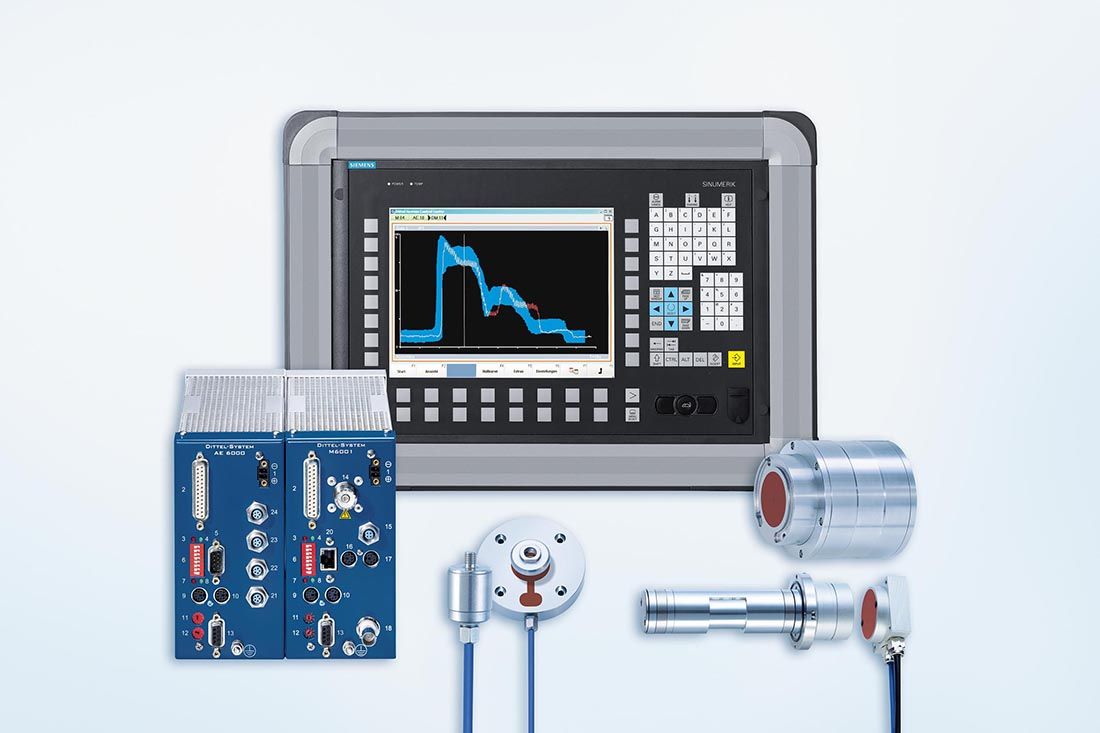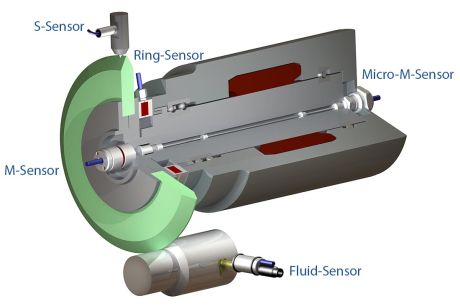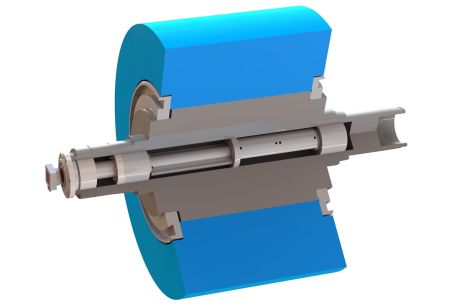DS6000 is the line designed for high precision grinding machines and it is ideal for both the mechanical balancing, and for monitoring acoustic emissions. The balancing operations can be performed onone or two planes, based on the application.
The DS6000 modular series of products, allow users to add and combine different modules to achieve a multi-function system.
This innovative system is very flexible so that it can meet the customer's requirements and offer the operator a wider range of functions which are always easy to use.
The DS6000 system includes the electronic units for the pre-balancing, the electromechanical balancing check and hydraulic balancing and for the acoustic emissions check. Modules available:
- AE6000 and S6000: units for checking the acoustic emissions
- DM6000: unit for the process check (AE sensors + Digital Torque Adapter)
- P6000: unit for the pre-balancing
- M6000: unit for checking the electromechanical balancing
- H6000: unit for the hydraulic balancing
The modules are installed in the electrical cabinet and the data can be viewed on the remote panel or on the CNC PC with a specific software application. The software DSCC (DITTEL System Control Center) has been developed for automation systems based on the Windows operating system, like Siemens SINUMERIK, Heidenhain, Fanuc or Bosch-Rexroth and PCs.
The communication between the modules and the automation system is performed through static interface, Profibus and RS232 or Ethernet.
All the modules, their checks and the most important measuring signals can be viewed on the machine monitor, providing the operator with an overview of all the functions and information.
All the data necessary for the series initialisation can be saved in an XML file and transferred on another machine control to save time. This also ensures that the default settings can be restored easily.
The intelligent use of the display allows the user to fully exploit the machining parameters and significantly reduce the production costs.
The units of the line are compact, sturdy and easy to use. They can be installed outside the machine cabinet.
- Increased production process quality
- Reduction of the cycle time in the dressing phase
- Efficient air gap check
- Increased life of the individual machine components (spindle, grinding wheel, etc.)
- Greater protection against collision for the grinding wheel and the machine
- Modular solution
- Mainframe for the cabinet
- Connection between modules: CAN bus
- Power supply: 24V DC
- I/O static interface
- Profibus interface
- Frequency spectrum of the acoustic emissions
- Flexible integration of new specific software functions thanks to the open architecture system.
- PC connection: RS232
- Connection to the remote panel: Ethernet
- HMI: DSCC (Dittel System Control Center) with Windows operating system
The DS6000 system includes:
AE6000
The automatic grinding or dressing processes must be performed safely and in a stable way to produce high quality parts. The process monitoring based on very sensitive acoustic emission sensors, combined with the AE6000 electronic unit provides the ideal solution to increase the stability of the process. This system can manage up to four channels and can reduce the air gap time, identify the first contact during the dressing, monitor the grinding process and the collision or damage to the grinder.
S6000
For the automation of the grinding or dressing phases it is increasingly important to optimise the process and guarantee the quality of the parts produced.
The acoustic emission (AE) signal is the ideal solution for this control.
The S6000 system has two channels which can be used to monitor two different processes.
DM6000
The DM6000 process monitoring module analyses the data provided by the acoustic sensors and from the internal check (DTA).
The increased demands on the grinding processes compared to the past has led to the introduction of new technologies. To fully exploit the high speed cutting capacity of the machines, special sensors must be used to detect the threshold values during grinding and dressing. If the values measured exceed the allowed tolerance, corrective actions can be undertaken before the machining process degenerate without the intervention of the machine operator.
The internal check data are transferred via Profibus to the assigned monitoring module.
P6000
During the manual balancing, the imbalance is measured whilst the machine is operating and it is compensated by the weights or by adding defined weights in the grinder locking flange. The spindle is balanced in one plane (P6001) or in two planes (P6002), based on the application
- Variable angles method: the imbalance is compensated by moving two equal weights (sliding blocks) in the positions calculated.
- Fixed positions method: the imbalance is compensated by adding defined weights (e.g.: screws) in specific positions
M6000
The M6000 electronic unit used for the electromechanical check of the balancing has been developed for use on grinders.
M6000 measures the quantity and the position of every grinder imbalance.
The compensation is performed during the part change phase in the grinding process. The compensation weights are moved electro-mechanically with extreme accuracy and the cycle is performed at the operational rotating speed. The power transmission is performed with a contactless inductive system.
The spindle can be balanced on one or two planes (with two modules), based on the application.
H6000
The H6000 hydraulic balancing check system has been developed for use on precision grinders without internal balancing systems for the grinder support spindle. H6000 measures the position and amount of imbalance constantly during the grinding process and calculates the position of the compensation weight. The coolant (emulsion or oil) is injected in one of the chambers of the balancing container, with extreme precision and at the operational rotating speed.
BROCHURES AND MANUALS
| Installation and User Manual | |
|---|---|
| English |
H6001: (4.63MB)
SSW6000: (935.20kB) AE6000 Basic: (844.60kB) P6001 Active: (7.54MB) S6000: (4.37MB) RC6000 + M6000: (1.52MB) RC6000 + H6000: (1.44MB) RC6000 + AE6000: (1.44MB) P6002: (15.30MB) P6002 Active: (14.80MB) P6001FD: (8.41MB) P6001: (7.55MB) M6001: (4.81MB) M6000: (7.79MB) HBA4000R: (3.09MB) H6000: (4.53MB) DM6000 Profibus: (6.35MB) DM6000: (6.44MB) AE6001: (6.06MB) AE6000: (9.16MB) |
| Italian |
M6000: (5.00MB)
M6001: (4.71MB) S6000: (3.89MB) AE6000: (5.27MB) H6001: (4.73MB) P6002: (14.19MB) RC6000 + M6000: (2.59MB) |
| German |
M6001: (5.69MB)
SSW6000: (931.68kB) S6000: (4.24MB) RC6000 + H6000: (1.52MB) P6002: (15.32MB) P6002 Active: (15.53MB) P6001FD: (8.62MB) P6001: (8.73MB) P6001 Active: (8.69MB) M6000: (8.97MB) HBA4000R: (2.23MB) H6001: (5.22MB) H6000: (5.25MB) DM6000 Profibus: (6.73MB) DM6000: (6.57MB) AE6001: (6.34MB) AE6000: (10.25MB) AE6000 Basic: (847.39kB) |
| French |
S6000: (7.33MB)
H6000: (10.01MB) H6001: (10.26MB) M6000: (4.45MB) M6001: (4.44MB) P6002: (13.76MB) RC6000 + AE6000: (2.73MB) AE6000: (12.20MB) AE6000 Basic: (844.45kB) |
| Spanish |
H6000: (7.34MB)
P6001FD: (8.26MB) M6001: (7.67MB) M6000: (9.64MB) H6001: (7.44MB) AE6000: (9.35MB) |
| Czech |
M6000: (5.36MB)
H6000: (5.41MB) DM6000: (8.78MB) AE6000: (6.14MB) |
| Hungarian |
AE6000: (4.33MB)
|
| Swedish |
AE6000: (4.10MB)
|
| Romanian |
AE6000: (9.03MB)
H6000: (8.01MB) |
| Turkish |
M6000: (4.81MB)
|
| Portoguese |
AE6000: (8.38MB)
|
| Traditional Chinese |
M6000: (4.64MB)
AE6000: (9.70MB) |


